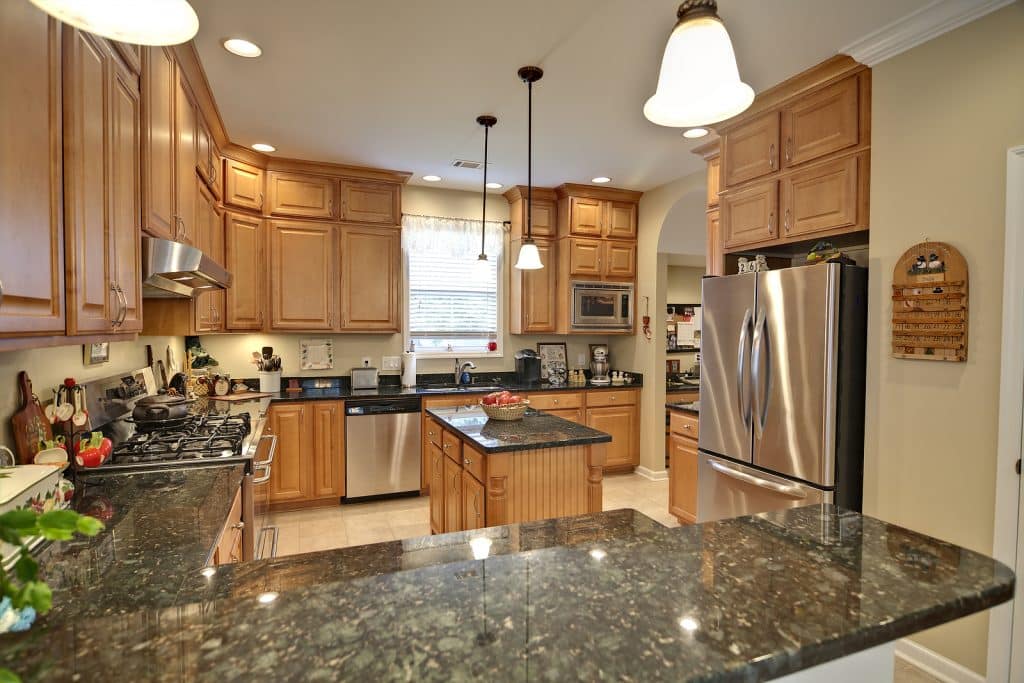When it comes to selecting countertops, deciding between soapstone and granite can feel overwhelming. Both options offer unique advantages, aesthetic appeal, and practical benefits, but they also come with key differences that could impact your decision. This guide breaks down everything you need to know about soapstone and granite countertops, helping you make the right choice for your home.

What Are Soapstone Countertops?
Soapstone is a natural stone often found in shades of black, white, gray, green, and blue. Known for its smooth texture and timeless appeal, soapstone offers a rustic and sophisticated look. Its unique characteristics have made it a favorite for homeowners seeking something a little different from traditional granite or quartz.
Key Features of Soapstone Countertops
- Durability
While soapstone is softer than granite, it’s still a durable option for countertops. Minor scratches and nicks can easily be sanded out, ensuring the surface remains smooth and visually appealing. - Natural Patina Development
One of soapstone’s most striking features is its ability to develop a patina over time. The surface darkens naturally, giving it an aged, rich appearance that some homeowners love. You can even speed up this process with mineral oil if you prefer a darker, more uniform look. - Nonporous and Stain Resistant
Unlike granite, soapstone is naturally nonporous. This means it won’t absorb liquids, making it resistant to stains from spills like wine, coffee, or oil. - Heat Resistance
Soapstone is highly heat-resistant, which makes it an excellent choice for kitchens. You can safely place hot pots and pans directly on the surface without worrying about damage. - Unique Aesthetic
With its muted tones and soft veining, soapstone has a unique, understated beauty. It’s perfect for those who want a natural stone with character and warmth.
Potential Drawbacks of Soapstone
- Softness
Soapstone is softer than granite, so it’s more prone to scratches and chips. While these imperfections can be fixed, it’s worth considering if you’re rough on your countertops. - Limited Color Range
Soapstone is typically found in darker, muted shades. If you’re looking for bright or vibrant colors, this may not be the best option for you.
What Are Granite Countertops?
Granite is a natural stone known for its durability, versatility, and striking visual appeal. It’s one of the most popular choices for countertops due to its wide range of colors, patterns, and finishes.
Key Features of Granite Countertops
- Unmatched Durability
Granite is one of the hardest natural stones available, making it extremely resistant to scratches, chips, and cracks. This durability makes it ideal for busy kitchens and households. - Variety of Colors and Patterns
Granite comes in an impressive array of colors, from light whites and grays to bold blues, reds, and blacks. Each slab is unique, so your countertop will have a one-of-a-kind design. - Heat Resistance
Like soapstone, granite is also heat-resistant, so you don’t have to worry about hot pans or pots damaging the surface. - Value Addition
Granite countertops are considered a premium feature in homes and can significantly boost property value. They’re a great investment for homeowners planning to sell in the future. - Sealed Surface for Stain Resistance
Granite is porous, but when properly sealed, it resists stains and bacteria. Regular sealing is recommended to maintain its protective barrier and keep the surface looking pristine.
Potential Drawbacks of Granite
- Sealing Required
Unlike soapstone, granite needs regular sealing to maintain its resistance to stains and moisture. Neglecting this step can result in discoloration or damage. - Weight and Installation
Granite slabs are heavy and require professional installation. Cabinets may need reinforcement to support the weight of the countertop.
Side-by-Side Comparison: Soapstone vs. Granite
| Feature | Soapstone | Granite |
| Durability | Softer, can scratch or chip | Extremely durable, resists scratches |
| Heat Resistance | Excellent | Excellent |
| Stain Resistance | Naturally nonporous | Requires sealing to resist stains |
| Maintenance | Minimal, occasional mineral oil application | Requires regular sealing |
| Aesthetic | Muted tones with natural patina development | Bold colors and unique patterns |
| Price | Slightly more expensive | Wide range, generally more affordable |
| Longevity | Long-lasting with proper care | Long-lasting with proper sealing |
Choosing the Right Countertop for Your Home
Your choice between soapstone and granite will ultimately depend on your personal preferences, lifestyle, and budget.
When to Choose Soapstone
- You prefer a warm, rustic aesthetic with natural patina development.
- You want a countertop that’s naturally stain-resistant and low-maintenance.
- You’re okay with occasional refinishing to fix minor scratches.
When to Choose Granite
- You love bold, vibrant patterns and a wide variety of colors.
- You need a countertop that can handle heavy use without showing wear.
- You’re willing to invest in regular sealing for added durability.
Why Visit a Showroom?
One of the best ways to make a decision is to see the materials in person. Touching the stone, examining its patterns, and visualizing how it will look in your kitchen can make the choice much easier. Granite and soapstone each have their own unique appeal, and seeing them up close can help you determine which one suits your style and needs.
Ready to Transform Your Space?
Visit Wholesale Granite Direct to explore a wide selection of soapstone and granite countertops. Our knowledgeable team can guide you through the selection process and ensure you find the perfect stone for your home. Call 817-962-2616 in Arlington or 817-710-8604 in Granbury to schedule a consultation or visit our showroom today! Let us help you bring your dream kitchen or bathroom to life.

